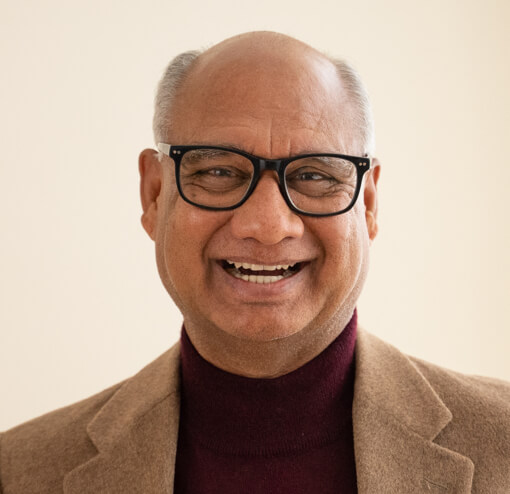Q: All cultures and religions acknowledge the importance of prayer, but it seems like the purpose of prayer is different in different times, places, and contexts. What is the role of prayer in yoga? Who or what are we praying to? What are we asking for?
A: The foundation for prayer in the yoga tradition is the realization that there is a divine force guiding every activity at both the microlevel and macrolevel of our existence. The truth of this is self-evident. The divine force is beneficent and all-encompassing. We don’t have to ask it to supply the right balance of gases in the air we breathe or to regulate our breathing, heart rate, or digestive system—the divine force is doing that at every moment. When we begin to comprehend this, the desire awakens to experience this force more intimately. The effort to connect our awareness with all-pervading divinity is the essence of prayer.
We start our prayer as a beggar and our pleas turn into complaints.
What most of us have come to think of as prayer is very different. These prayers often go something like this: “Please, God, give me this, give me that. Protect me from this, save me from that.” And many people even go a few steps further: “God, where is your mercy? Why have you given my daughter cancer? Why aren’t you helping me?” We start our prayer as a beggar and our pleas turn into complaints.

Many of us pray only in dire situations. Say we are on an airliner and the pilot announces one of the engines has failed. We are frightened but our fear is not overwhelming—we have enough presence of mind to grab our phone and begin texting our friends and family. But when the pilot announces the second engine has failed, panic sets in and we start to pray: “My God, save me!” But at such times our consciousness is flooded with fear—perhaps even with anger at whoever we imagine is responsible for this catastrophe—and our mind is not fit for prayer.
This is an extreme example, but the truth is we usually pray only when we are in trouble—when we are anxious, frightened, or feeling vulnerable. The goal of such prayers is quite narrow: “God, make my biopsy negative.” “Please, God, help me find a good job.” Sometimes such prayers are full of conditions: “If you help me out of this jam, I will make a donation to charity.” These are low-grade, self-centered prayers—we are attempting to use God as a tool to free us from our problems and miseries.
Divine support is ever present and never failing.
When we are in a relatively better space—somewhat healthier, happier, more peaceful, or confident—and when our mind is relatively free of anger, hatred, fear, and the desire for revenge, we can pray in a more composed, less self-centered way. But at that time, we no longer care. It’s a case of “I love you when I need you; I don’t care for you when I don’t need you.”
What we fail to realize is that we are in need of divine support at every moment, and further, that divine support is ever present and never failing. We don’t have to ask for it, let alone beg for it. A baby is born, and in a matter of seconds, it begins to breathe. Throughout our life, breathing is so automatic that we rarely stop to wonder what supports and controls our breathing. We have a degree of mastery over ourselves and some of the things that surround us, but we have absolutely no control over the force that propels our breath. We know the medulla regulates our involuntary life-sustaining functions, such as breathing and digestion. But what regulates and empowers our medulla?

God-centered prayers flow from the recognition that higher reality is with us every instant. But even these prayers come in various grades. Low-grade God-centered prayers remind us how small we are. Such prayers are not necessarily meant to connect us with the vast and all-encompassing divinity, but instead to remind us we are so small and helpless that something outside us must come to our aid. That kind of God-centered prayer makes us small due to its smallness. We are praying to God to help us go to heaven; we are not praying to God to help us become a better person so we can create our own heaven right here while we are alive.
High-quality God-centered prayers make us bigger and brighter. They are a means of connecting ourselves to the self-luminous intelligence that shines in the core of our being. Such prayers flow from the understanding that our mind and senses function only because there is a self-aware force empowering them. Infused with wonder and gratitude, these prayers are like an invisible thread connecting us with the divine. This thread is strengthened when spun with feelings of faith, love, and total surrender. They infuse us with the realization that the will of the divine is unfailing and ever auspicious. When this realization dawns, the quality of our faith and the quality of our prayers grow exponentially. The goodness within and without starts bearing fruit, and we see there is a wonderful heaven right here. That is the meaning and purpose of prayer in the yoga tradition.
